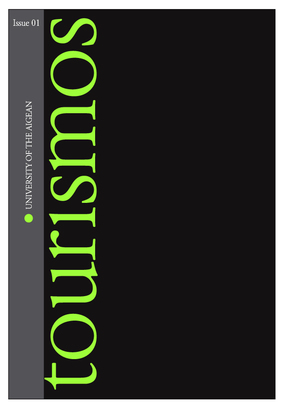Perspectives and practices of CSR in the hospitality industry : analyzing a case study
Part of : Tourismos : an international multidiciplinary journal of tourism ; Vol.8, No.2, 2013, pages 1-19
Issue:
Pages:
1-19
Section Title:
Research papers
Abstract:
This paper aims to offer a preliminary case study of CSR issues being addressedin the hospitality sector in order to disseminate best practice. By employing aqualitative research findings reveal that Meliá Hotels International has its ownapproach to CSR by incorporating a new cultural dimension to this notion.Moreover, findings illustrate how MHI define its CSR policy according to thestakeholder approach, being the main beneficiaries from these activitiesconsumers and local communities. This study also provides evidence that strengthof CSR commitment varies by topic, and that value creation for MHI can beuncertain since many CSR initiatives do not cause a reduction in costs.
Subject (LC):
Keywords:
corporate social responsibility, cultural dimension, stakeholders, local communities, hospitality sector
Notes:
Περιέχει σχήματα, πίνακες και βιβλιογραφία
References (1):
- Altheide, D.L. (1996). Qualitative media analysis. Qualitative Research Methods.Thousand Oaks, Sage.Ayuso, S. (2006). Adoption of voluntary environmental tools for sustainabletourism: Analyzing the experience of Spanish hotels. Corporate SocialResponsibility and Environmental Management, Vol. 13, pp.207-220.Bigné, J.E., Font, X. & Andreu, L. (2000). Marketing de los destinos turísticos.Análisis y estrategias de desarrollo. Madrid, ESIC Market.Bohdanowicz, P. & Zientara, P. (2009). Hotel companies´ contribution toimproving the quality of life of local communities and the well-being oftheir employees. Tourism and Hospitality Research, Vol. 9, No.2, pp.147-158.Bohdanowicz, P., Zientara, P. & Novotna, E. (2011). International hotel chainsand environmental protection: An analysis of Hilton’s we care!programme (Europe, 2006-2008). Journal of Sustainable Tourism, Vol.19, No.7, pp.797-816.Carroll, A.B. (1998). The four faces of corporate citizenship. Business and SocietyReview, Vol. 100, No.1, pp.1-7.Chan, E.S.W. (2011). Implementing environmental management systems in smalland medium-sized hotels: Obstacles. Journal of Hospitality & TourismResearch, Vol. 35, No.1, pp.3-23.Liu, I.D. & Lin, C.F. (2011). The development of cultural tourism: A review ofUK experience. Tourismos: An International Multidisciplinary Journal ofTourism, Vol. 6, No.2, pp.363-376.Chung, L.H. & Parker, L.D. (2010). Managing social and environmental actionand accountability in the hospitality industry: A Singapore perspective.Accounting Forum, Vol. 34, pp.46-53.Cuccia, T. & Rizzo, I. (2011). Heritage and tourism: Theoretical and empiricalissues. Tourismos: An International Multidisciplinary Journal of Tourism,Vol. 6, No.3, pp.37-56.Elkington, J. (1997). Cannibals with forks: The triple bottom line of the 21stcentury business. Oxford, Capstone Publishing, Ltd.European Commission (2002). Corporate Social Responsibility: A businesscontribution to sustainable development. Luxembourg, EuropeanCommission Directorate General for employment and social affairs. UnitD.I, Industrial Relations and Industrial Change.Font, X., Walmsley,A., Cogotti, S., McCombes, L. & Häusler, N. (2012).Corporate social responsibility: The disclosure performance gap.Tourism Management, Vol. 33, pp.1544-1553.Freeman, R.E. (1984). Strategic Management: A stakeholder approach. Boston,Pitman.Garay, L. & Font, X. (2011). Doing good to do well? Corporate socialresponsibility reasons, practices and impacts in small and mediumaccommodation enterprises. International Journal of HospitalityManagement, Vol. 31, No.2, pp.329-337.Göbbels, M. (2002). Reframing corporate social responsibility: The contemporaryconception of a fuzzy notion (cited in van Marrewijk 2003).Green Hotels Association (2005). Ηttp://www.greenhotels.com/whatare.html.Accessed the 20 th of May 2013.Henderson, J.C. (2007). Corporate social responsibility and tourism: Hotelcompanies in Phuket, Thailand, after the Indian Ocean tsunami.International Journal of Hospitality Management, Vol. 26, No.1, pp.228-239.Jovicic, D. (2011). The environmental management systems and contemporarytourism development. Tourismos: An International MultidisciplinaryJournal of Tourism, Vol. 7, No.1, pp.377-391.Kasim, A. (2007). Towards a wider adoption of environmental responsibility inthe hotel sector. International Journal of Hospitality & Tourism, Vol. 8,pp.25-49.Khairat, G. & Maher, A. (2012). Integrating sustainability into tour operatorbusiness: An innovative approach in sustainable tourism, Tourismos: AnInternational Multidisciplinary Journal of Tourism, Vol. 7, No.1, pp.213-233.Lee, S. & Park, S. (2009). Do socially responsible activities help hotels andcasinos achieve their financial goals? International Journal of HospitalityManagement, Vol. 28, No.1, pp.105-112.Liu, I.D. & Lin, C.F. (2011).The development of cultural tourism: A review ofUK experience. Tourismos: An International Multidisciplinary Journal oftourism, Vol. 6, No.2, pp.363-376.Madsen, H. & Ulhi, J.P. (2001). Greening of human resources: Environmentalawareness and training interests within the workforce. IndustrialManagement & Data Systems, Vol. 101, No.2, pp.57-65.Maignan, I. & Ferrell, O.C. (2004). Corporate social responsibility and marketing:An integrative framework. Journal of the Academy of Marketing Science,Vol. 32, No.1, pp.3-19.Martínez, P., Pérez, A. & Rodríguez del Bosque, I. (2013a). Exploring the role ofCSR in the organizational identity of hospitality companies: A Case fromthe Spanish tourism industry. Journal of Business Ethics, Publishedonline, DOI: 10.1007/s10551-013-1857-1.Martínez, P., Pérez, A., & Rodríguez del Bosque, I. (2013b). Responsabilidadsocial corporativa: Definición y práctica en el sector hotelero. El caso deMeliá Hotels International. Revista de Responsabilidad Social de laEmpresa, Vol. 5, No.1, pp.141-173.Martínez, P., Pérez, A. & Rodríguez del Bosque, I. (2013c). Measuring corporatesocial responsibility in tourism: Development and validation of an efficientmeasurement scale in the hospitality industry. Journal of Travel &Tourism Marketing, Vol. 30, pp.365-385.McGehee, N.G., Wattanakamolchai, S., Perdue, R.R. & Calvert E.O. (2009).Corporate social responsibility within the U.S. lodging industry: Anexploratory study. Journal of Hospitality and Tourism Research, Vol. 33,pp.417-437.Nergiz1, H., Kozak, M. & Balta, S. (2011). Ethical approaches and theirapplication in hotel managers´ decision making, Tourismos: AnInternational Multidisciplinary Journal of Tourism, Vol. 6, No.1, pp.84-104.Truñó i Gual, J. & Rialp, J. (2008). La responsabilidad social corporativa: Gestiónempresarial de un activo intangible. Revista de Contabilidad y Dirección,Vol. 7, pp.1634-1684.Tsai,W.H., Hsu, J.L., Chen, C.H., Lin, W.R. & Chen, S.P. (2010). An integratedapproach for selecting corporate social responsibility programs and costsevaluation in the international tourist hotel. International Journal ofHospitality Management, Vol. 29, No.3, pp.385-396.van Marrewijk, M. (2003). Concepts and definitions of CSR and corporatesustainability: Between agency and communion. Journal of BusinessEthics, Vol. 44, No.2, pp.95-105.van Marrewijk, M. & Were, M. (2003). Multiple levels of corporate sustainability.Journal of Business Ethics, Vol. 44, No.2, pp.107-119.Whitehouse, L. (2006). Corporate social responsibility: Views from the frontline.Journal of Business Ethics, Vol. 63, No.3, pp.279-296.World Business Council for Sustainable Development (1999). Corporate socialResponsibility: Meeting Changing Expectations. Switzerland.World Commission on Environment and Development (1987). Our CommonFuture. Oxford: Oxford University PressYin, R.K. (1989). Case Study Research: Design and Methods. Applied socialResearch Methods Series. Newbury Park CA, Sage.




